
-
 Israel says no humanitarian aid will enter Gaza
Israel says no humanitarian aid will enter Gaza
-
Anxiety clouds Easter for West Bank Christians

-
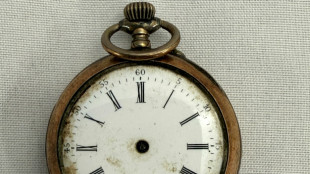 Pocket watch found on Titanic victim to go on sale in UK
Pocket watch found on Titanic victim to go on sale in UK
-
UK top court rules definition of 'a woman' based on sex at birth

-
 All Black Ioane to join Leinster on six-month 'sabbatical'
All Black Ioane to join Leinster on six-month 'sabbatical'
-
Barca suffer morale blow in Dortmund amid quadruple hunt

-
 China tells Trump to 'stop threatening and blackmailing'
China tells Trump to 'stop threatening and blackmailing'
-
Iran FM says uranium enrichment 'non-negotiable' after Trump envoy urged halt

-
 Automakers hold their breath on Trump's erratic US tariffs
Automakers hold their breath on Trump's erratic US tariffs
-
Cycling fan admits throwing bottle at Van der Poel was 'stupid'

-
 Troubled Red Bull search for path back to fast lane
Troubled Red Bull search for path back to fast lane
-
China's forecast-beating growth belies storm clouds ahead: analysts

-
 ASML CEO sees growing economic 'uncertainty' from tariffs
ASML CEO sees growing economic 'uncertainty' from tariffs
-
Heineken beer sales dip, tariffs add to uncertainty

-
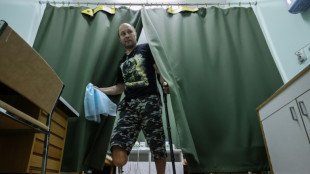 Rehab centre for Russian veterans from Ukraine fills up
Rehab centre for Russian veterans from Ukraine fills up
-
Dutch flower industry grasps thorny pesticide issue

-
 Solar boom counters power shortages in Niger
Solar boom counters power shortages in Niger
-
Malnourished children in Afghanistan at 'high risk of dying' without US aid

-
 Skating comeback queen Liu says she can get even better for Olympics
Skating comeback queen Liu says she can get even better for Olympics
-
'Let's rock': world music icon Youssou N'Dour back on the road

-
 Mackerel and missiles: EU-UK defence deal snags on fish
Mackerel and missiles: EU-UK defence deal snags on fish
-
Istanbul's Hagia Sophia prepares for next big quake

-
 'Magician' Chahal casts spell with IPL heroics
'Magician' Chahal casts spell with IPL heroics
-
WHO countries strike landmark agreement on tackling future pandemics

-
 Kerr salutes Harvard defiance over Trump after Warriors win
Kerr salutes Harvard defiance over Trump after Warriors win
-
Canada party leaders hold high-stakes debate two weeks from vote
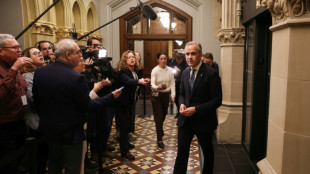
-
 As war grinds on, Ukraine's seniors suffer
As war grinds on, Ukraine's seniors suffer
-
ASML CEO sees 'increased macro uncertainty' from tariffs

-
 Pope leaves faithful guessing over Easter appearances
Pope leaves faithful guessing over Easter appearances
-
Butler, 'Batman' Curry shine as Warriors down Grizzlies to reach playoffs

-
 Skating 'Quad God' Malinin ready for Olympic favourite tag
Skating 'Quad God' Malinin ready for Olympic favourite tag
-
Toppmoeller has ascendant Frankfurt challenging their limits

-
 Cambodia's Chinese casino city bets big on Beijing
Cambodia's Chinese casino city bets big on Beijing
-
Vespa love affair: Indonesians turn vintage scooters electric

-
 Europe seeks to break its US tech addiction
Europe seeks to break its US tech addiction
-
Long-abandoned Welsh mine revived as gold prices soar

-
 UK's top court to rule on how to define a 'woman'
UK's top court to rule on how to define a 'woman'
-
WHO countries reach landmark agreement on tackling future pandemics

-
 Stocks struggle again as Nvidia chip curb warning pops calm
Stocks struggle again as Nvidia chip curb warning pops calm
-
China's economy beats forecasts ahead of Trump's 'Liberation Day'

-
 China's economy beat forecasts in first quarter ahead of Trump's 'Liberation Day'
China's economy beat forecasts in first quarter ahead of Trump's 'Liberation Day'
-
Trump orders critical minerals probe that may bring new tariffs

-
 Onana faces date with destiny as Man Utd chase Lyon win
Onana faces date with destiny as Man Utd chase Lyon win
-
Lessons in horror with Cambodia's Khmer Rouge tribunal

-
 Pandemic agreement: key points
Pandemic agreement: key points
-
Paramilitaries declare rival government as Sudan war hits two-year mark

-
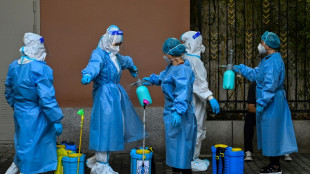 Landmark agreement reached at WHO over tackling future pandemics
Landmark agreement reached at WHO over tackling future pandemics
-
'La bolita,' Cuban lottery offering hope in tough times

-
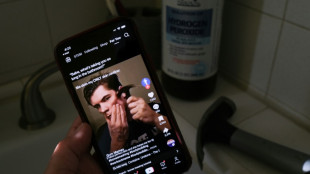 'Toxic beauty': Rise of 'looksmaxxing' influencers
'Toxic beauty': Rise of 'looksmaxxing' influencers
-
Facebook added 'value' to Instagram, Zuckerberg tells antitrust trial


From nightmares to PTSD: Covid stokes UK health care staff crisis
Long shifts working in intensive care and the risk of catching Covid and passing it on to his wife and children left Joan Pons Laplana exhausted.
"By the end of the second wave I was all over the place. I had nightmares, panic attacks. I started having suicidal thoughts, mood swings," he told AFP.
"My personal life was falling apart."
Laplana, a 46-year-old Catalan who lives in Chesterfield, northern England, had suffered burnout even before the global health crisis hit.
But the intense work pressure saw him diagnosed with post-traumatic stress disorder, and forced him to quit as a nurse to protect his mental health -- joining tens of thousands of health workers who have resigned during the pandemic.
"I saw a patient my age with a daughter my daughter's age," he said, recalling how the girl said goodbye over an electronic tablet moments before her father passed away.
"I started having nightmare seeing the eyes of the dad."
Laplana is not alone.
In 2020, as Europe battled soaring cases of Covid, alarm bells were already being sounded about the emotional and psychological impact of the pandemic on frontline medics.
In Britain, the relentless pressure has led to an exodus of staff: some 33,000 workers quit the state-run National Health Service (NHS) in the third quarter last year.
That was almost double compared with the final quarter of 2019, just before coronavirus arrived in Britain.
According to official statistics, nearly 7,000 of those who resigned in the third quarter of 2021 said they wanted a better work-life balance.
- Long shifts -
Akshay Akulwar has not yet resigned but has thought about relocating abroad -- to New Zealand or Australia where salaries are higher -- or to his home country India.
The surgeon, who works in eastern England and is a spokesman at the Doctors' Association UK, said the long hours affect well-being, personal and family life.
The pandemic has seen him on call, work night shifts and do more hours than ever before, he said.
"Slowly and gradually you feel burnout, you start to work less effectively. You cannot go on at this elevated level of activity for so long, " he said.
Public sector union Unison said more than two-thirds of medical staff have suffered burnout during the pandemic, and more than half worked beyond their contractual hours.
As a result, more than half of the sector's employees are looking for a new job, deepening recruitment problems caused by retirement, Brexit and new immigration rules.
Unison's head of health, Sara Gorton, said staff had been "wrung dry by pandemic pressures" as they cover for sick colleagues and feel guilty about not providing quality care.
"The NHS was already more than 100,000 staff short before coronavirus. The pandemic has upped the strain on health employees, and many have had enough," she added.
Staff shortages caused by the rapid spread of the Omicron variant of coronavirus saw soldiers drafted in to help in British hospitals and ambulance services.
Bill Palmer, from the Nuffield Trust health sector think-tank, said NHS staff felt a "professional obligation" to stay on after the first year of the pandemic.
Between 2016 and the start of the outbreak, there had been a growing trend towards staff quitting their posts. Now after a pause, resignations are rising again, he added.
- 'Like a number' -
How to plug the gaps of staff departures in the NHS is a pressing problem for the government, with the pandemic having caused a huge backlog in treatment and surgeries.
The Nursing and Midwifery Council has said that last year there were some 8,000 fewer nurses from European Economic Area nations than in 2016.
More than half of EU nurses leaving Britain cited the country's departure from the bloc as a reason for their decision.
Getting medical and social care staff from further afield is also problematic, with tighter post-Brexit immigration rules also proving a block on recruitment.
Higher salaries in other sectors are proving a draw for lower-paid, non-medical NHS staff.
Alex, who declined to give his full name, said he quit his job as a community mental health nurse in northwest England because he felt "treated like a number and not like an individual".
His workload increased by 25 percent but the additional responsibilities did not see his pay increase, affecting his own mental health.
He now works for with victims of modern slavery and domestic violence.
"I have similar pay but less stress, less workload," he said. "I feel supported."
K.Brown--BTB

